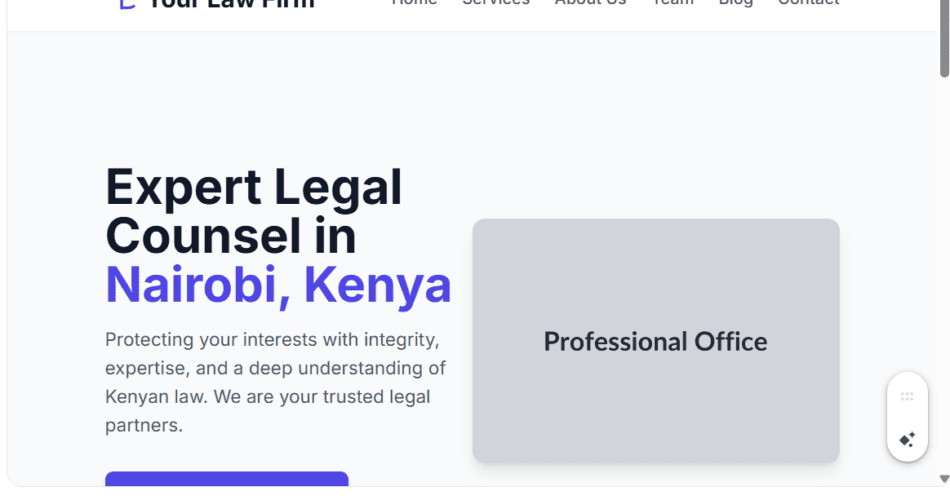SEO for Law Firms in Kenya
- Delivery Time2 Weeks
- English levelProfessional
- LocationUSA, United Kingdom, United Arab Emirates, New York, Nairobi, Kilimani, Kenya, Dubai, CBD Nairobi, Canada, Australia
Service Description
The cost of SEO for Law Firms in Kenya is 80000KES per month.Get SEO for Law Firms in Kenya at a price of 30000KES per month at Black Shepherd Technologies.
Legal Services in Nairobi, Kenya: Your trusted law firm specializing in corporate law, family law, and litigation. Get expert legal counsel and representation from our experienced team. Contact us for a consultation today.
In today’s digital-first world, a strong online presence is essential for a law firm’s growth and success. Search Engine Optimization (SEO) for law firms is the strategic process of optimizing your website and online content to rank higher in search engine results. This increased visibility helps you attract qualified leads, build authority, and ultimately, grow your client base. This guide will provide a thorough overview of the key components of an effective SEO strategy for legal practices.
The Foundation: Your Law Firm Website
Your website is the centerpiece of your SEO strategy. It’s not just an online brochure; it’s a powerful tool for generating new business. A well-optimized website is fast, secure, mobile-friendly, and easy for both users and search engines to navigate.
User Experience (UX): A good user experience is a major ranking factor. Your site should have a clean design, clear navigation, and be easy to read. A slow-loading website or one that’s difficult to use on a smartphone will quickly cause visitors to leave, increasing your bounce rate and signaling to search engines that your site isn’t providing value.
Technical SEO: This involves the backend elements of your website that affect its performance. Key technical aspects include a secure SSL certificate (HTTPS), a clear site structure, and a sitemap to help search engines crawl and index your pages effectively.
Keyword Research: The Cornerstone of Your Strategy
Before you can optimize your website, you need to know what your potential clients are searching for. Keyword research is the process of identifying the words and phrases people use to find legal services.
Practice Area Keywords: These are the most direct keywords related to the services you offer. For example, “family law attorney,” “personal injury lawyer,” or “criminal defense.”
Location-Specific Keywords: Most legal searches are local. Combining your practice area with your location is crucial for attracting local clients. Think “divorce lawyer Boston” or “estate planning attorney Chicago.”
Long-Tail Keywords: These are longer, more specific phrases that often have lower search volume but a higher conversion rate. Examples include “what to do after a car accident in Texas” or “how to file for bankruptcy in California.” These keywords reflect a user’s intent to find a specific solution to a problem.
By using a mix of these keywords, you can create content that addresses a wide range of user needs and intentions.
On-Page SEO: Optimizing Your Content
On-page SEO involves optimizing the content and HTML source code of a page to rank for specific keywords.
High-Quality Content: This is the most critical element of on-page SEO. Your content should be original, in-depth, and provide real value to your audience. This can include blog posts, detailed practice area pages, and FAQs. The goal is to establish your firm as an authority in your field.
Title Tags and Meta Descriptions: These are the clickable headlines and short descriptions that appear in search results. They should be compelling, include your primary keywords, and encourage users to click on your link.
Heading Tags (H1, H2, H3): Use heading tags to structure your content logically and make it easy to read. Your primary keyword should be in your H1 tag, and supporting keywords should be in your H2 and H3 tags.
Internal Linking: Link relevant pages on your website to each other. This helps search engines understand your site’s structure and allows users to easily find related content.
Local SEO: Dominating Your Geographic Market
For most law firms, local clients are the lifeblood of their practice. Local SEO is a set of strategies designed to increase your visibility in local search results.
Google Business Profile (GBP): Your GBP is your most powerful local SEO tool. Claim and optimize your profile with accurate information, including your firm’s name, address, and phone number (NAP). Encourage clients to leave reviews, and respond to all reviews promptly and professionally.
Online Reviews: Positive reviews on your GBP and other review platforms build trust and credibility. They are a major ranking factor for local searches.
Local Citations: Ensure your firm’s NAP information is consistent across all online directories and citation sites. This includes legal directories, business listings, and social media profiles.
Off-Page SEO: Building Authority and Trust
Off-page SEO involves activities performed outside of your website to improve its ranking. The most important off-page factor is link building.
Backlinks: A backlink is a link from another website to yours. Search engines view backlinks as a vote of confidence. High-quality backlinks from reputable websites can significantly boost your firm’s authority. Strategies for earning backlinks include:
Guest Blogging: Writing articles for other legal blogs or industry websites.
Content Creation: Creating unique, valuable content that other sites will naturally want to link to.
Media Mentions: Getting your firm mentioned in news articles, legal publications, or podcasts.
Social Media: While social signals aren’t a direct ranking factor, an active social media presence can increase your firm’s visibility and drive traffic to your website.
Measuring Success and Adapting Your Strategy
SEO is an ongoing process, not a one-time project. You must continuously monitor your performance and adapt your strategy. Use tools like Google Analytics and Google Search Console to track key metrics:
Organic Traffic: How many visitors are coming to your site from search engines?
Keyword Rankings: Are you ranking for your target keywords?
Conversions: Are visitors filling out contact forms, calling your office, or downloading resources?
By regularly analyzing this data, you can identify what’s working, what’s not, and make informed decisions to improve your SEO performance over time. A strong SEO strategy for a law firm is a long-term investment that can lead to a consistent flow of high-quality leads and sustainable growth for your practice.








